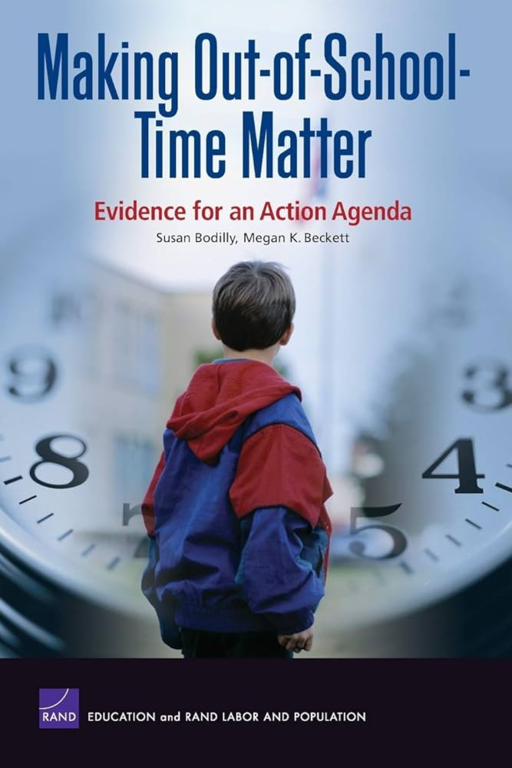Breadcrumb
- Wallace
- Reports
- Making Out-Of-School-Time Matter...
Making Out-of-School-Time Matter
Evidence for an Action Agenda

- Author(s)
- Susan Bodilly and Megan K. Beckett
- Publisher(s)
- RAND Corporation
- DOI Link
- https://doi.org/10.7249/MG242
Summary
How we did this
This report documents an examination of the literature about OST programming to clarify and inform the key issues in ongoing discussions about services.
What are ways to increase the positive impact of out-of-school-time (OST) programming—and make sense of the research about the field? To help answer that, this report examines, organizes, and summarizes knowledge about OST programs as of 2005. It also identifies areas that need more research.
Major Issues Explored
The report assesses research in several key areas:
Demand for OST services. The review found only a limited number of studies suggesting unmet demand for services. In contrast, research on existing programs revealed a significant number of open slots in programs and student absentees.
Outcomes. The analysis suggested that these programs had, at best, modest positive effects on academic achievement, academic attainment, and reducing risky behaviors. Results also might have differed according to grade level, program content, site context, and other elements.
Improving participation. Researchers found empirical evidence that participation varied by participant background. For that reason, targeting services might increase participation. For example, lower-income families might be more attracted to subsidized programs located in their neighborhood.
Boosting capacity. Suggestions ranged from joint planning by providers and funders to giving providers incentives for offering improved services.
Key success factors. Researchers found a growing consensus about program factors associated with improved youth outcomes, such as having high expectations, a clear mission, a safe, healthy, and supportive environment, and a small total enrollment.
Recommendations
Researchers make a variety of recommendations for improving OST programming and the level of debate. They include:
- Local assessments. That means using surveys and other field instruments to clarify the level of demand for services by classes of clients, as well as the quality of existing providers.
- More-systematic program evaluations. They should include documentation of the effect of program designs on outcomes and the impact by age group or class of participants. Measuring cost-effectiveness is also important.
- Forums and incentives. They would be used to disseminate existing and evolving standards and best practices.
- Standardized measures of participation levels and intensity. They would be included in program evaluations.
- Support for collection and analysis of data. The information would be used in decision making, monitoring, and continuing assessment of OST services.
The available evidence suggests improving the quality of existing programs is more important than the rapid growth of new ones, the authors say. Designing and implementing effective programs will involve careful planning and attention—and significant funding.
Key Takeaways
- Researchers found that lower-income families might be more attracted to subsidized OST programs that are located in their neighborhood.
- Key success factors include having a clear mission, high expectations, and a safe, healthy, and supportive environment.
- For better results, programs should have more-systematic program evaluations, standardized measures of participation levels, and support for the collection and analysis of data.
- Improving the quality of existing programs is more important than the rapid growth of new ones.
Materials & Downloads

[I]mprovement in program quality could have the effect of increasing demand.

